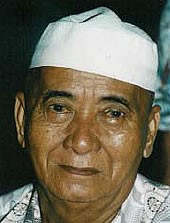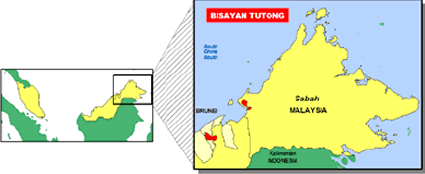The Bisaya-Tutong peoples comprise several distinct people groups related by name and, to a lesser extent, language. The most populous group among them are the Tutong, who are located in Brunei along the banks of the Limbang River south of Tutong and into the northern part of Sarawak, East Malaysia. The Tutong are considered closely related to the two groups that call themselves Bisaya, one located in Brunei and one located in Sarawak. Similar, but more distinct, are the Bisaya of Sabah, found around Brunei Bay in the Kuala Penyu and Beaufort districts, and the Tatana people, also located in the Kuala Penyu district. The Bisaya-Tutong people groups speak languages which are classified as Bisaya, a subgroup of the Dusunic family of languages.
The Bisaya-Tutong are culturally diverse and live in small groups interspersed among other peoples. They have adapted many of their cultural features from these peoples. Little is known of their history. In the past, their reputation was a violent one. There was much inter-tribal warfare, and the Bisayan warriors beheaded their enemies to gain power.
A typical Bisaya-Tutong village, which accommodates 30 to 200 people, is located along a riverbank and contains a number of rice granaries. These villages are permanent settlements made up of small, long rectangular houses built on piles 10-15 feet above the ground. Three or four families usually live together under one roof. The diet of the Bisaya-Tutong consists of rice and a variety of fruits and vegetables. Most houses have a small garden to supply food necessities. Both wet and dry rice are cultivated in burned clearings, and other crops, such as chilies, maize, cucumbers, pumpkins, yams, gourds, and various fruits are also grown.
The men are skilled in carpentry and woodcarving. The women tend to the house and gardens, and gather ferns, fruits, and medicinal plants. They trade with the Chinese for cloth, metal goods, and pottery.
Most Bisaya-Tutongs converted to Islam many years ago. Yet many animistic customs linger, especially among those of the older generation. In some villages, they still hold occasional ceremonies to appease the spirits of the dead that are believed to be associated with a collection of skulls from their headhunting days.
In hilltop Bisaya graveyards, one can spot interesting items that the departed soul has valued. Rusting foot-operated sewing machines, run-down wall clocks, and other machine-made items, such as plates, cups, and store-bought shirts are there. These items were placed on the graves at burial for the departed soul to use in the next life.
Most of the Bisaya-Tutong have never had an opportunity to hear the good news. They need Christ's ambassadors to go to them so they can experience the abundant life that only Jesus offers.
Pray that the good news and other study materials will be translated into their language so they can fully understand His truth.
Pray that believers in other areas will reach out to these people in practical ways, demonstrating God's care and love for them.
Pray for the Lord to give them an abundant rice harvest as a testimony of his love and power.
Scripture Prayers for the Tutong, Bisayan in Malaysia.
Southeast Asia Link – SEALINK, Copyrighted © Used with permission.
| Profile Source: Joshua Project |











